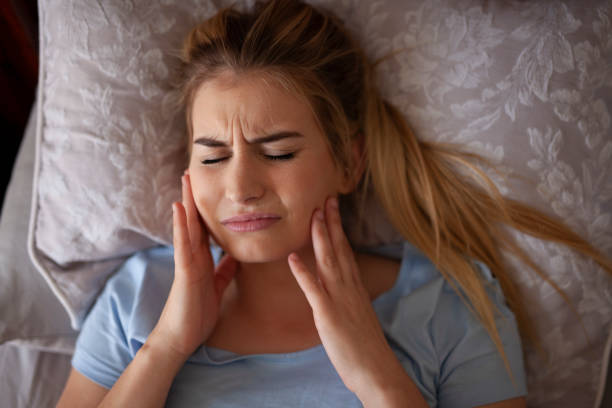As your Lincoln Square Dentist, we know that teeth grinding, medically known as bruxism, is a very common condition that affects 10 percent of adults and 15 percent of children in the U.S.
Teeth grinding is usually done unconsciously at night (sleep bruxism) and can be caused by crooked or missing teeth, an abnormal bite, the clenching of the jaw or a sleep disorder such as sleep apnea. Grinding can also occur during the day (awake bruxism) and may be due to emotions such as anxiety, stress, anger, frustration, or tension. It may also be a coping strategy or something done during deep concentration.

Symptoms of Bruxism
Because it’s often done at night, many people may be unaware they’re grinding their teeth, but the most common symptoms include:
- Disrupted sleep
- Headaches or facial pain, especially in the morning
- Earaches
- Teeth fractures or loose or painful teeth
- Sore jaw muscles or jaw pain
- Temporomandibular joint discomfort (TMJ) that sounds like clicking or popping in the jaw
- Locking jaw
- Pain while eating
Children and Bruxism
Children as well as adults can suffer from teeth grinding. In fact, it is quite common in children, but because of the rapid growth of their jaws and the replacement of their baby teeth, most children outgrow the problem by the time they reach adolescence.
Potential Harm From Bruxism
For adults, bruxism usually does not cause serious complications, but in severe cases it can lead, in addition to the aches and pains mentioned above, to a loosening, fracturing, or loss of teeth. Chronic grinding may also wear teeth down to stumps. In these severe cases, bridges, crowns, root canals, implants, partial dentures, and perhaps even complete dentures may be needed.
Non-Dental Treatment Options
In cases of stress and teeth grinding, behavioral management may prove to be extremely helpful. Relaxation techniques, meditation, regular exercise, and professional counseling can help manage stress and anxiety.
Other self-help options to help with teeth grinding include:
- Avoiding or cutting back on foods and drinks that contain caffeine, including coffee, colas, and chocolate.
- Avoiding alcohol as grinding tends to intensify after alcohol consumption.
- Not smoking.
- Not chewing on non-food items like pencils and pens.
- Training yourself not to clench or grind your teeth during the day. One technique to help accomplish that is placing the tip of your tongue between your teeth to train your jaw muscles to relax.
Teeth Grinding Treatment in Chicago
At Cornerstone Dental of Lincoln Square we practice both general dentistry, cosmetic dentistry, and restorative dentistry, and if you have a problem with teeth grinding there are several ways we can help you including:
- A custom-made mouth guard that cushions your teeth and prevents them from grinding as you sleep.
- In cases where grinding has led to sensitivity, reshaping the chewing surfaces of the teeth, or using crowns to repair the damage.
If teeth grinding is a persistent problem, call Cornerstone Dental of Lincoln Square to arrange a consultation for one of our dental care services. Teeth grinding is not something you have to live with and can be resolved with a night guard, dental implants, or another solution to prevent pain or tooth loss.
Please don’t run the risk of serious damage to your teeth. Contact our dental practice for assistance today!



